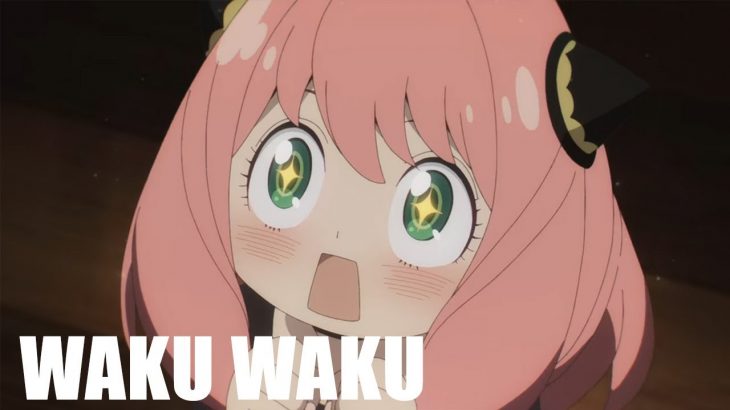【視聴数 137315】
【チャンネル名 That Japanese Man Yuta】
【タグ 動画,ビデオ,共有,カメラ付き携帯電話,動画機能付き携帯電話,無料,アップロード,チャンネル,コミュニティ,YouTube,ユーチューブ】
SPY×FAMILY★youtubeまとめたサイト スパイファミリー関係のyoutube動画リンクをまとめました!スパイファミリーのチャンネル探しに便利です!最新の役立つスパイファミリー情報があります!

【視聴数 137315】
【チャンネル名 That Japanese Man Yuta】
【タグ 動画,ビデオ,共有,カメラ付き携帯電話,動画機能付き携帯電話,無料,アップロード,チャンネル,コミュニティ,YouTube,ユーチューブ】
「これするだけでおこずかい7000円ゲット!?」中学生でもスマホがあればできる期間限定キャンペーンを利用して7000円分ポイントをゲットする方法がこちらw
【また爆益キター!!】TikTokキャンペーンを利用して簡単に3200円貰う方法がこちらw【期間限定】
No matter what, I will always appreciate a Monogatari reference.
6:32 ”When something falls … it’s considered bad luck.” – Holy shit, this gives a whole new meaning to that scene in Attack on Titan season 2 episode 6 where the flag pole breaks off and falls down the wall.
彼女は子供なので、おそらくそれが彼らが彼女のためにそのような言葉を使う理由です.
In English, I’ve also seen fictional characters referring to themselves by name as a sign of having delusions of grandeur. Is it the same in Japanese, or would the closest equivalent be ore-sama or something?
What if she’s referring to them that way because they aren’t actually her real parents?
Good explanation.
Yuta, have you seen “Kotaro Lives Alone”? If you have, how common is this sort of situation in Japan? I had a Japanese teacher who once off-handedly mentioned that there were a lot of children living by themselves in Japan. Now clearly Kotaro’s situation isn’t very likely (a 4-year-old renting an apartment by himself), but I was wondering if you had any insights or information on the subject? Unfortunately, America also has a problem with children being abandoned to fend for themselves. And I guess for some strange reason I believe the Japanese people (being more community minded) would handle it better than Americans (most being selfish and uncaring about problems not directly affecting them). What do you think Yuta? Is this even a problem? I only assume it is because the series touches so heavily upon the subject of neglected children. Or is it simply because of the writer’s personal experience? I’d be VERY curious to see an interview with someone who lives near a child or children living on their own and how they deal with it. Or even what the Japanese government does about it. Thanks
I think the reason she uses “chichi” when she is talking to her dad directly is because they were talking about how she would refer to her dad in public to keep appearances
daijoubumasu and irumase are some of my favorite Anya-isms so far! lol
Something else to consider about Anya’s speech, since she can hear people’s thoughts, she’s learned words, phrases, and manners of speaking from the people around her. Using the aggressive, imperative form of speaking may very well be something she picked up from the orphanage, which gives us a little more insight into her past.
how about the “oira”
「困ってる人が入るます」It should be 居る instead of 入る. Or just hiragana.
i mean anya is adopted
chichi is incorrect but its cute 😊
Now that I know “Haha” and “Chichi” is not the words for us to call our father and mother, every time Anya say “haha” and “chichi” will feel so sad.
In Anya’s head, she has no concept about her own father and her own mother. She only know about the other ppl’s mothers and fathers. So “Okaa-san” or “otou-sama” word are just too strange for her. She just don’t know.
Really good and detail character build from Tatsuya Endo the author.
Cant wait to see Anya able to say Okaa-san and Otou-san.
The seiyuu and writing team did a great job, the dub version is so bad as it just sounds like an adult just reading lines. Most people know that Japanese children don’t speak like this, but this really does portray a childish nature.
I really like how the writers incorporated Anya’s past in her way of speaking. She often uses words that are way too complicated because she picked those up in that lab probably, but fails on stuff like grammar because she has not been in school yet or anything. She still refers to herself as “Anya” which is probably a bit too childish for her age (although not specified), but it is not surprising considering her lack of social/emotional development due to her past. And then also the way she refers to her parents, probably only as she heard other kids talk about their parents, and the fact that she quotes TV a lot because that is her daily entertainment, it all fits so perfectly with who she is and where she came from.
「大丈夫ます」ー Anya
That made me crack up hearing it.
Aanya no chinchin (笑)
Anya is the best.
I noticed the polite-form mistakes, too. I think she was trying to use polite-form on school grounds to appear “elegant!” so she had a better chance of passing the interview.